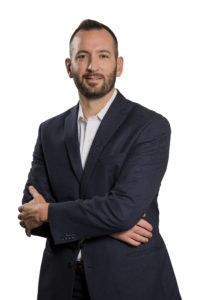BY Nathan Boon, Senior Program Officer, Watershed Protection, William Penn Foundation &
Sulaiman Rahman, Founder and CEO, DiverseForce
The nonprofit world lives in the shadow of systemic racism. This is not new news, and its effects on non-governmental organizations are both well-documented and at the forefront of many funders’ minds.
The partnership and cohort-based training program we have created together is not the only or complete answer to this challenge, but it is worth sharing because we believe it’s replicable, affordable, and impactful.
We’ve each sought to leverage what’s called the network effect in our work: Nathan Boon in the world of grantmaking at the William Penn Foundation, and Sulaiman Rahman in the realm of recruitment and professional development at DiverseForce. The network effect describes the observation that organizations designed around large, diverse networks enjoy more success and impact than those that are not. Over the past two years, we’ve worked together to activate the network effect to address power inequities across the Greater Philadelphia region’s nonprofit sector, including within organizations working on environment and conservation, where lack of inclusion is especially prevalent.
In all areas of our grantmaking, from multi-state watershed protection programs such as the Delaware River Watershed Initiative, to our work fostering learning and creative communities, we are eager to address this challenge. The dearth of diverse leadership at nonprofit organizations has made many less equipped to address a wide variety of the social and environmental needs facing our region — needs made all the more urgent by COVID-19, climate change, and the movement for Black lives. This leadership gap is not unique to William Penn Foundation’s grantees, but part of a national trend holding the sector back from realizing its full potential.
In addition to the foundation’s own ongoing internal work in this area, we’ve supported organizations throughout our networks who are hungry to learn and grow into more equitable agents for change. The missing piece of the puzzle was a partner who could work with grantees to shift culture and practice where the most influential decisions were being made: the boardroom.
Enter DiverseForce.
DiverseForce was born of the network effect. It grew out of the Urban Philly Professional Network, a series of events drawing 18,000 Black and Latinx professionals to make connections, talk politics, and become more civically engaged. The program evolved into a trusted resource for companies and organizations seeking more diverse board leadership. The driving insight of the DiverseForce On Boards program? That even the most well-intentioned boards often lack the network and outlook needed to recruit and retain members of color.
DiverseForce became connected with the William Penn Foundation through an evaluation partner, the ImpactED Center at the University of Pennsylvania. ImpactED was a key adviser in the design of the On Boards curriculum. Starting in 2019, the three organizations explored ways to bring DiverseForce’s network and expertise to the foundation’s grantees, with the understanding that it’s not enough to place “Black and brown faces in high places.” There needs to be culture-shift, education, and ongoing support — for both the candidate and the organization.
To date, more than two dozen regional nonprofit organizations have seated 30 new board members from the DiverseForce program, from stalwart institutions to small local groups. Many organizations share with us that their DiverseForce board recruits are the most engaged and innovative members they have. Melinda Johnson, a recent match for Camden, New Jersey’s landmark Center for Aquatic Sciences, now chairs their board’s development committee.
The William Penn Foundation-DiverseForce partnership is ongoing and retooling in light of COVID. In the interim, here are five lessons learned as other grantmakers look to leverage the network effect:
1. Invest in networks. All too often, organizations ask the same three people of color in their orbit to volunteer their time and give unpaid advice. One way funders can counter this exploitative practice is to invest directly in organizations with networks to build relationships and co-create service opportunities.
2. Invest in system-wide capacity. William Penn Foundation had numerous one-on-one conversations with grantees where they shared equity as a growth area and critical need. When the opportunity arose to work with DiverseForce, the foundation saw it as an effective way to support multiple grantees across its entire portfolio. DiverseForce’s cohort model also amplifies peer-to-peer learning between the organizations.
3. Prepare the soil before planting the seed. DiverseForce works to upskill organizations while seating new board members. This practice is crucial so that candidates are not placed in non-inclusive environments. This preparation includes training to identify racial blindspots that have become institutionalized at an organization over time, and on how to value a candidate for their “culture add,” rather than “culture fit.” This process also equips organizations to embrace healthy conflict that arises from new candidates bringing fresh ideas.
4. Grow the candidate. DiverseForce prepares candidates to bring their full, impactful selves to the boardroom. Coaching candidates for several organizations in a cohort model, DiverseForce works to instill confidence, build “governance muscles”, and combat the imposter syndrome that professionals of color say they sometimes experience when entering new institutional spaces. One new board member was inspired by her experience to subsequently run for her local school board.
5. And finally: You can’t micromanage equity. The William Penn Foundation made its investment in DiverseForce and then stepped out of the way. This partnership would not have worked without the foundation remaining flexible, open, and culturally humble.
_________
About the Authors:

Nathan Boon, Senior Program Officer, Watershed Protection, William Penn Foundation
Nathan supports science- and data-driven approaches to protect and restore the Delaware River watershed: drinking water source for New York City, Philadelphia, Trenton and Wilmington. Before joining the William Penn Foundation in 2012, Nathan worked with the consulting firm Booz Allen Hamilton providing strategic planning and portfolio management services. Nathan was previously embedded in francophone Cameroon with the 501(c)(3) nonprofit Breaking Ground, engaged with a local municipality in water-quality analysis and health-impact assessment. Nathan’s nonprofit experience also includes time as a board member with the American Water Resources Association, National Capital Region Section, and membership with the American Public Health Association, Environment Section.

Sulaiman Rahman, Founder and CEO, DiverseForce
Sulaiman W. Rahman is the founder and CEO of DiverseForce, a strategic human capital solutions firm that specializes in cultivating diverse leadership pipelines and inclusive ecosystems across all sectors. In 2017, DiverseForce partnered with the University of Pennsylvania to develop DiverseForce On Boards, an innovative leadership development program that trains mid-to-senior level professionals of color from the public and private sectors to serve more effectively on nonprofit boards in the region. The program’s success has attracted support from major corporations and foundations.
Rahman currently serves as vice president of the board of directors for Community College of Philadelphia Foundation; board of trustee and executive committee member for Mastery Charter Schools; board member and governance committee member for the Kimmel Center of Performing Arts; and board member for Lendistry, a start-up fintech company. Rahman also serves on numerous advisory boards and committees.
Interested in contributing to TFN’s Blog?
TFN is committed to sharing and amplifying the insights, expertise and experiences of our members, partners and others in the broader philanthropic community. If you are interested in submitting a guest blog post, please reach out to TFN Director of Communications Tere Figueras Negrete at tere@fundersnetwork.org.
